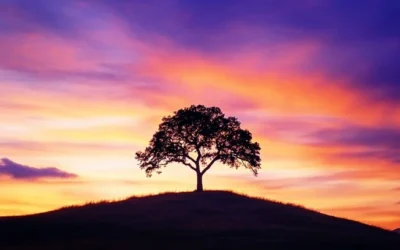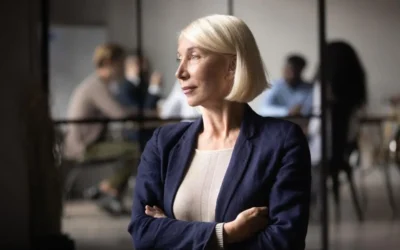Back in Australia for Christmas, I’m reminded of a moment five years ago, in early 2020, that feels both distant and vividly present.
Charred leaves drifted down from an apocalyptic sky as I hurriedly helped my parents pack up their most precious belongings before fleeing the advancing bushfires. The air was thick with smoke, the future uncertain, and fear felt as close as the ash falling softly around us.
I recall thinking, “Surely nothing will eclipse this as the defining event of the year.”
Huh.
That day marked the beginning of an extraordinary chapter—some experiences chosen, others thrust upon me—which added a whole new dimension to my understanding of courage. Courage, I realized, isn’t just about taking action despite fear. It’s also about managing our fear so it doesn’t override rational thinking, narrow our perspective, undermine our decisions, and paralyze us when we most need to act.
Research supports this. Studies* show that when we’re gripped by fear, our sympathetic nervous system floods our body with cortisol and adrenaline, narrowing our cognitive and emotional capacity to think clearly. But when we consciously regulate our emotional state, we can shift from reactive fear to intentional courage.
In short: managing our fear isn’t about ignoring it—it’s about preventing it from hijacking our ability to respond wisely.
Lessons from Fear, Uncertainty, and the Space Between Them
Just months after the fires, as the pandemic tilted the world off its axis, my husband, Andrew, was hospitalized as one of Singapore’s first COVID patients, locked in their quarantine system for 30 days. At the same time, I was quarantined in our apartment with our son, Ben, while our other three children—10,000 miles away in the US—found themselves suddenly homeless as dorms closed and borders slammed shut.
For two years, I was unable to reach my mother in Australia as dementia slowly stole her away, separated by international travel restrictions and an overwhelming sense of helplessness.
Yet it wasn’t just my personal journey—including relocating from Asia to the US in late 2020—that deepened my understanding of courage. Over the last five years, I’ve worked closely with high-achieving leaders across sectors—from Fortune 500 boardrooms to political leaders in emerging democracies—and I’ve observed a striking pattern:
It’s rarely a lack of skill, intelligence, or opportunity that keeps us stuck—it’s a deficit of courage.
The Courage Gap: Why We Hesitate
Time and time again, I’ve seen incredibly capable people hesitate—not because they didn’t know what to do, but because they were afraid of what might happen if they did it.
Fear creates a gap:
- Between what we could do and what we actually do.
- Between what we need to say and what we actually say.
Some refer to this as the know/do gap or the think/do gap. I call it the ‘courage gap.’ And learning how to close it is crucial—not just for meeting our most pressing problems, but for realizing our most inspiring aspirations.
As Gandhi once said:
“The difference between what we do and what we are capable of doing would suffice to solve most of the world’s problems.”
The reality is that even the bravest among us can fall victim to fear. But courage doesn’t mean the fear disappears. It means we move forward anyway.
Facing 2025 with Courage
As we stand on the cusp of a new year, uncertainty remains a constant. Whether it’s in our careers, our relationships, or the broader world around us, fear will inevitably show up. But it doesn’t have to lead the way.
Over the last five years, I’ve seen fear hold back leaders, innovators, and visionaries—not because they lacked intelligence or insight, but because they overestimated the risks and underestimated their ability to handle them.
Yet courage isn’t about eliminating fear—it’s about choosing who you’ll be in its presence.
Whether the flames are literal—like those falling burnt leaves I saw five years ago—or metaphorical, showing up as uncertainty, conflict, or doubt, courage remains our most valuable ally.
If those leaves taught me anything, it’s this:
The world doesn’t need your perfection. It needs your courage.
A Shameless Plug for The Courage Gap
If these reflections resonate, I dive much deeper into this topic in my new book, The Courage Gap, launching January 28th. In it, I share research, stories, and actionable steps to help you close your own courage gap—the space between who you are and who you have the potential to become.
👉 Join my launch team and get exclusive access to the Introduction + Foreword by General Stanley McChrystal and an invitation to my live webinar on January 21st 👉Click Here
Pre-order your copy on Amazon today 👉 Click Here






